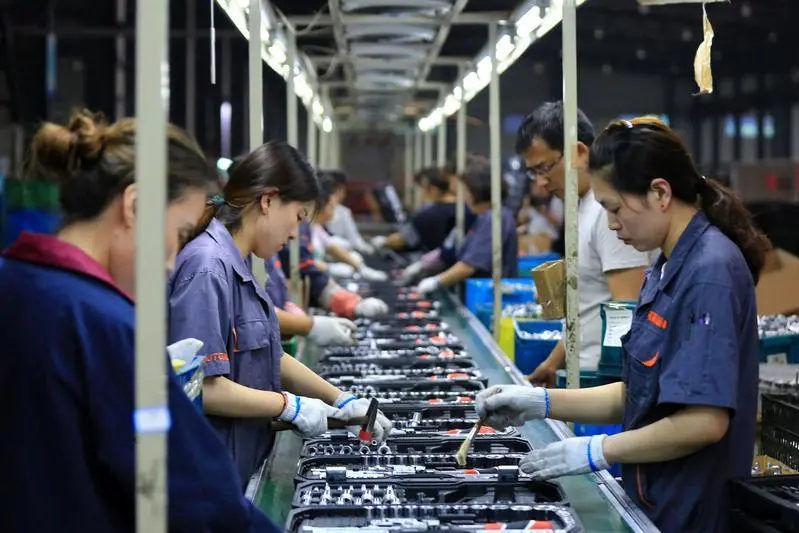PHOTO
China's manufacturing activity fell for a second month in June while services activity slipped to a five-month low, an official survey showed on Sunday, keeping alive calls for further stimulus as the economy struggles to get back on its feet.
The National Bureau of Statistics (NBS) purchasing managers' index (PMI), at 49.5 in June, was unchanged from May, below the 50-mark separating growth from contraction and in line with a median forecast of 49.5 in a Reuters poll.
"Actual industrial activity should be stronger than the data suggests as our observation is that the official PMI fails to fully capture the current export momentum, which has been the major economic driver this year," said Xu Tianchen, senior economist at the Economist Intelligence Unit.
Still, Xu added that external and domestic demand remains relatively inadequate to absorb China's manufacturing capacity and this will prevent a recovery in producer prices.
While a sub-index of production was above 50 in June, other indexes of new orders, raw material stocks, employment, supplier delivery times and new export orders were all in contractionary territory, the NBS survey showed.
China's exports exceeded forecasts in May, but analysts said the jury is still out on whether export sales are sustainable given growing trade tension between Beijing and Western economies. Meanwhile, a protracted property crisis continues to drag on domestic demand.
With consumers wary and the Labour Day holiday boost fleeting, the non-manufacturing PMI, which includes services and construction, fell to 50.5 from 51.1 in May, the lowest since December.
The services PMI sank to 50.2, a five-month low, and construction PMI slipped to 52.3, the weakest reading since July last year.
Analysts expect China to roll out more policy support measures in the short term, while a government pledge to boost fiscal stimulus is seen helping kick domestic consumption into a higher gear.
"The weak PMI figures naturally call for more supportive policies from the Chinese government. However, the room for monetary policy easing is limited for the time being, as the Chinese currency is under pressure," said Hao Zhou, chief economist at Guotai Junan International.
"That said, fiscal policy is likely to take the driving seat, suggesting that the central government will need to issue more debt over the foreseeable future to boost the overall domestic demand."
But high local-government debt and deflationary pressure cast a long shadow over recovery prospects, despite a slew of measures officials have rolled out since last October, tempering investors' and factory owners' expectations.
China's central bank last month announced a relending programme for affordable housing to accelerate sales of unsold housing stock so supply better matches demand.
Officials are under pressure to fire up new growth engines to reduce the economy's reliance on property.
Premier Li Qiang told a World Economic Forum meeting on Tuesday that growth of new industries was supporting healthy economic development.
"Since the beginning of this year, China's economy has maintained an upward trend... and is expected to continue to improve steadily over the second quarter," Li said.
Economists and investors are awaiting for the Third Plenum to be held on July 15-18 with hundreds of China's top Communist Party officials gathering in Beijing for the five-yearly meeting.
(Reporting by Joe Cash and Ellen Zhang; Additional reporting by Ryan Woo; Editing by William Mallard and Christopher Cushing)





















